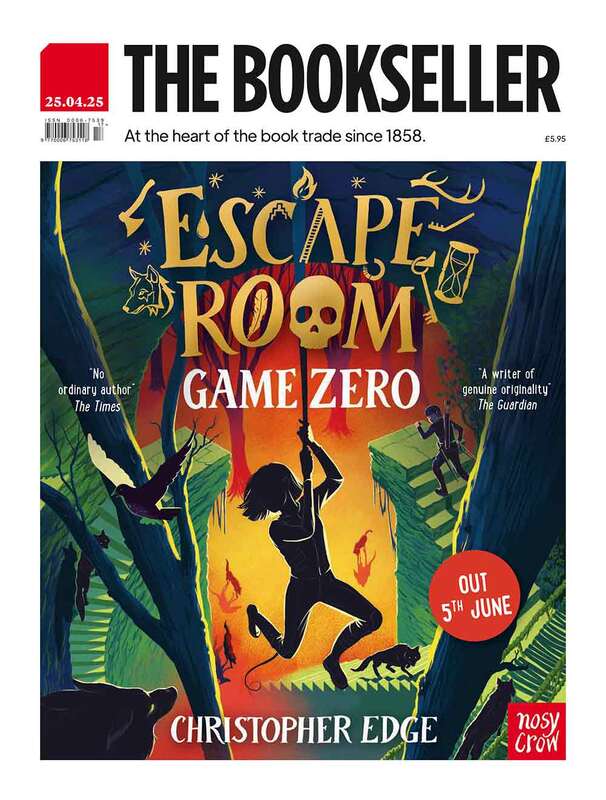You are viewing your 1 free article this month. Login to read more articles.
Anita Sethi | 'Healing comes from keeping open to the world and to other people'
 Caroline Sanderson
Caroline SandersonCaroline Sanderson worked as a Waterstones bookseller, and as a book publicist before becoming a freelance writer in 1997. The Bookseller’s
...moreIn May 2019, Manchester-born writer and journalist Anita Sethi was on a TransPennine train from Liverpool to Newcastle when she became the victim of a race hate crime, a male passenger attacking her with words that, she wrote later, “hurt the very heart of me”.
In May 2019, Manchester-born writer and journalist Anita Sethi was on a TransPennine train from Liverpool to Newcastle when she became the victim of a race hate crime, a male passenger attacking her with words that, she wrote later, “hurt the very heart of me”.
Sethi bravely reported the racial abuse to the conductor, who took statements from passengers and ensured the police were waiting on the platform to arrest the man on arrival at Newcastle (he was later convicted). In the aftermath, however, Sethi experienced panic attacks, along with a crushing sense of claustrophobia which made her long for wide open spaces—just as she did as a child growing up in inner-city Manchester.
The act of walking gave me such a feeling of belonging in my own body — my brown-skinned body. And a feeling of belonging, in the beautiful countryside of this green and pleasant land, as much as any white person does
Now, in an act not just of defiance but of asserted identity, Sethi has transmuted this trauma into the writing of her first book. In a powerful blend of memoir, current affairs, travel and nature writing, I Belong Here: A Journey Along the Backbone of Britain charts her solo journeys on foot through the Pennine Hills—through the open spaces she had been longing for—on a mission to reclaim the landscapes of her beloved north country from the racist who had told her to “get back on the banana boat”. When we speak via Skype, Sethi explains why his words were such a powerful catalyst for her book. “I’ve been racially abused before, and told so many times where I do and don’t belong. But when this man told me to go back to where I’m from, I thought: enough is enough. This is my home! Also, us northerners have a very close connection with where we’re from, so no one tells me I’m not from the north!”
This imbued sense of “northern-ness” is one of the most striking qualities of I Belong Here. Sethi riffs beautifully on north country vernacular with place names, and the names of geological features provide the starting-point from which to discuss a broad range of issues. For example, the chapter called “Scars”, in which she writes about climbing Pen-y-ghent via the high cliff known as Horton Scar, is also a reflection on loss and PTSD, and on healing. Arriving in the North Yorkshire town of Settle prompts her to ask questions about what it means to have a home, to belong, and what it is to lack or be displaced from these things. In fact the entire book is structured in a similarly allegorical way as an activist journey around the human body, from Mouth (“Speaking Up”; “Bearing Witness”) to Feet (“Walking and Witnessing”). And the fact that the Pennine Hills are popularly known as the backbone of Britain inspires a meditation on what it means to have backbone in a metaphorical sense—what we mean by strength, what people need in the way of social support structures.
In fact, just like the limestone strata of the Pennine sedimentary landscapes she so evocatively describes, I Belong Here is a work of many layers. Our wide-ranging Skype conversation reflects this, with Sethi excavating everything from the mental health crisis, systemic racism, isolation, and what it means to have a voice, to the protected characteristics of the 2010 Equality Act. But the book also beautifully expresses her love of the natural world, and her joy at the renewed sense of embodiment that comes from putting one foot in front of the other. “When you walk, you’re very aware of yourself physically. I’ve had high anxiety since childhood—and both anxiety and depression make you feel disassociated from your own self. But the act of walking gave me such a feeling of belonging in my own body—my brown-skinned body,” she tells me. “And a feel- ing of belonging, in the beautiful countryside of this green and pleasant land, as much as any white person does.”
Alongside her début, the first in a trilogy acquired in a three-book deal by Bloomsbury, Sethi has launched the I Belong Here foundation to promote equality in writing about nature and the great outdoors, through free writing workshops for those from low-income backgrounds. Post-pandemic, she plans “walk-shops” as well. “I did a pilot series of workshops last year, which worked really well. My ultimate vision is to create a storytelling centre in the inner-city neighbourhood in Manchester where I grew up. I have to do something to make the world a more equal place, and I want the foundation to be a backbone of activism. I’d really appreciate hearing from anyone who can offer sponsorship and help me make the dream a reality.”
Writing wrongs
Sethi’s desire to use her writing skills to enable others to find a sense of belonging in creativity is rooted in her firm belief in the power of language to help mitigate against systemic inequalities. “I’ve loved books and reading since childhood: the local library was a home for me. But I didn’t really feel my story had been reflected before. Toni Morrison said: ‘If there’s a book that you want to read, but it hasn’t been written yet, then you must write it’.” The process of writing I Belong Here has undoubtedly been a therapeutic one. “When you experience abuse, it can close you off from everything, but healing comes from keeping open to the world and to other people. Writing and walking, walking and writing, have helped me bear the seemingly unbearable,” she asserts.
At a time when so many have someone to grieve for, I Belong Here is a book about bearing loss too. Addressed on its the title page “To everyone who has ever felt like they don’t belong”, it is also dedicated to the memory of Sethi’s friend Sophie Christopher, the Transworld publi- cist who died unexpectedly in June 2019 at the age of 28. “It was just so shocking”, says Sethi, who came to know Christopher after chairing an event with Markus Zusak, author of The Book Thief. “She was one of those genuinely lovely people. One time we went for coffee and afterwards she sent me a beautiful handwritten card with the words ‘A Little Card Full of Magic and Joy’ on it. Every time I look at it now, I’m in awe of how her words live on.”
A watchful eye
Throughout our conversation, Sethi frequently expresses her concern for the welfare of others at this time, and this is all the more laudable given what she herself has been through over the past 18 months. Evicted from her London flat in the summer of 2020, she lived for a time in a budget hotel in Manchester, and is currently in Fuerteventura in the Canaries, where she went partly for the cheaper cost of living when travel there was still permitted. It might sound idyllic, but post-Brexit, she will soon have to return to the UK, with no fixed abode awaiting her.
Sethi at least has the certainty of knowing that I Belong Here has already received advance praise from a host of fellow writers, including Nikesh Shukla, Katharine Norbury and Robert Macfarlane, who describes it as a “brilliant, brave and important book”, and Sethi herself as a “vital and resonant voice”. And indeed she is. In one memorable passage, she describes how Christopher’s inky blue writing on the card she sent haunted Sethi’s dreams during her journey, merging with the inky blue Pennine rivers she had walked alongside by day. “To me ink is like life blood, just as rivers are. Having a pen and ink and putting words on a blank page is a way of saying: I’m still here.”
Book extract
All my life I felt like I didn’t belong, and I grew used to that sense of unbelonging; being an outsider has shaped my life in many ways, and made me become a writer. But there comes a time when it’s necessary to say: I belong here. It might come when someone is trying to push you from a place, to eradicate you. It might come when your basic rights are being denied. It might come when you are struggling to breathe clean air, when you are struggling to breathe at all. It’s exhausting having to prove and explain why we belong, yet so often have I had to do so on account of multiple macro and micro aggressions. Ultimately I hope for a world in which every creature great and small is accepted, and I don’t have to say it all.
For further information on the I Belong Here Foundation, visit anitasethi.com or email anita@anitasethi.com









